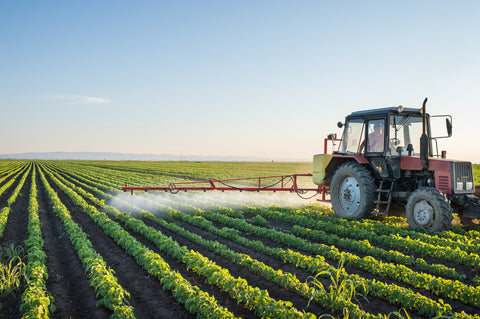
Today's agriculture makes heavy use of fertilizers and pesticides, which represent an invisible danger that may be hidden in any water supply, both in farming regions and areas downstream from them. Using a water filter that is rated to remove the majority of volatile organic compounds (VOCs) will help to forestall the long term health effects of these pervasive chemicals.
Huge megafarms and monoculture crops are responsible for the contemporary overabundance of fertilizers and pesticides. Though organic crops are becoming more popular and farmers' markets are, fortunately, thriving, the trend will take a long time to reverse itself, and in the meantime, the agricultural regions of most countries remain dangerously saturated in insecticides, fertilizers, and other chemical solutions to essentially artificial problems.
Growing endless square miles of the same crop greatly increases the risk of insect plagues and widespread plant diseases, since pests can find a vast supply of similar food covering the landscape, allowing their population to explode. Diversified crops lessen the risks of large scale pest infestations, but are scorned by large agribusinesses thanks to the drive to maximize profits. Pesticides are an easy solution that is used all too frequently today.
The fertilizer runoff from these huge industrial farms pollutes most rivers, large and small, and even flows out into the ocean, causing oxygen-consuming algae blooms that kill off huge numbers of fish. On an individual scale, fertilizers and pesticides are rarely present in concentrations that cause outright poisoning, but they may erode your health over the long term and raise the risk of certain types of cancers many times over.
Using water filters to remove pesticides, herbicides, and fertilizers from your water is a highly effective way to safeguard your health long-term. Since the same media also remove a slew of dangerous manufacturing chemicals – including benzene, solvents, and similar contaminants – passing your drinking water through one of these filters protects you from these risks, also.
Water filter descriptions usually indicate if the specific filter is designed to remove VOCs and solvents. Most are, but it is always worthwhile to check before purchasing, if you suspect or know that fertilizers, pesticides, or insecticides are present in your water. Note that it is possible to have your water tested for VOCs, which may cost several hundred dollars. However, if farmland is nearby or upstream of your location, it is probably safe to assume that these contaminants are present.
Granulated activated carbon is the type of media most often used to remove fertilizers and pesticides from drinking water. The granules provide a large surface area for the water to come in contact with, while the activated carbon absorbs the volatile organics in order to remove them from the stream. Other media are usually present to quash bacterial growth in the filter, such as a small amount of silver, though there are many different methods of doing this. The filter should be changed regularly, since an “overloaded” filter may “dump” some or all of the absorbed chemicals back into the allegedly filtered water. Using a good granulated activated carbon filter is an excellent way to ensure your water is free of volatile organic hazards, lessening everything from short-term mucous membrane irritation to lifetime cancer risk.

